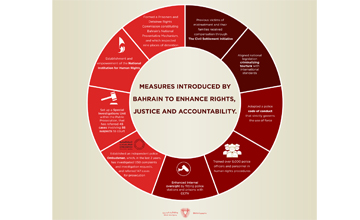ID :
396910
Sun, 02/14/2016 - 11:02
Auther :
Shortlink :
https://oananews.org//node/396910
The shortlink copeid
Bahrain's continuing reform- Marking 15 years of the National Action Charter

Manama, Feb. 14 (BNA): The following statement is issued to mark the 15th Anniversary of Bahrain’s National Action Charter, which ushered in the wide-ranging reform programme of HM King Hamad bin Isa Al-Khalifa and was overwhelmingly endorsed by 98.4% of voters:
Bahrain remains fully committed to delivering sustainable progress, through stable and meaningful democratic development – a journey that began 15 years ago with the signing of the National Action Charter (NAC) and which continues today.
The guiding principles laid down in the NAC remain fundamental to Bahrain’s continuing development and reform.
Bahrain has entered a new chapter of these reforms. The Government has accelerated measures that continue to advance individual rights and justice, enhance accountability and increase participation in sustainable democratic development.
This continuing reform – which includes enhancing the powers of parliament and the country’s democratic institutions –encompasses collaborative development with numerous international partners and allies.
Newly established institutions including the independent Ombudsman – the first of its kind in the region – the National Institute for Human Rights, and the Prisoners’ and Detainees’ Rights Commission have enhanced independent oversight immeasurably, winning international awards in the process.
The pace of progress cannot be slowed and will not be held back by groupings seeking to reject all attempts at political advance in favour of narrow, short-term interests. Recentparliamentary elections saw a clear majority of Bahrainis vote in favour of progress, electing a moderate majority of independent MPs, with a clear mandate to drive positive development by making use of parliament’s significantly increased legislative powers and oversight.
Bahrain’s priority remains the delivery of further reform through stable and meaningful democratic development and the strengthening of the Kingdom’s constitution and democratic institutions.
Notes to editors:
The Kingdom of Bahrain’s reform programme has seen the delivery of wide-ranging human rights, criminal justice, political, and socio-economic reforms since the events of 2011 – including:
o Independent Ombudsman: A fully functioning independent Ombudsman is in operation following its official launch in 2013 and is the first of its kind in the Middle East. More information can be found at:
http://www.ombudsman.bh/en/
o National Institute for Human Rights (NIHR): The NIHR develops, promotes and protects human rights within the Kingdom and was created with the assistance of the UN Office of the High Commissioner for Human Rights. The independent Ombudsman and the NIHR together shared the EU’s Chaillot Human Rights Prize in 2014. More information can be found at: http://en.nihr.org.bh
o Prisoners’ and Detainees’ Rights Commission (PRDC): The PRDC monitors conditions and treatment of prisoners to ensure they meet international standards. The PRDC is entirely independent and conducts unannounced inspections of detention facilities. More information can be found at: http://www.pdrc.bh
o National Preventative Mechanism (NPM): Bahrain now has a legally defined NPM to ensure mistreatment does not take place, in line with the United Nations Optional Protocol to the Convention Against Torture.
o Special Investigations Unit (SIU): A Special Investigation Unit has been established within the Public Prosecutor’s Office to determine the criminal liability of government officials who have committed illegal acts that have resulted in injury or abuse.
o Human rights training: Over 8,200 police officers and Ministry of Interior personnel have received human rights training since 2011.
o Parliamentary elections: Successful parliamentary elections were held in November 2014. A record number of candidates registered, including the highest ever number of female candidates – and the majority of Bahrainis took advantage of their democratic right to vote (53% voter turnout). 36 out of parliament’s 40 MPs are now independent and non-aligned with any political or religious grouping.
o Parliament’s increased powers: Parliament has drafted and approved a range of social and economic legislation since 2011 – including for the first time in Bahrain's history, parliament was given the right of approval over the government’s State Budget and Government Action Plan.
o Housing reforms to improve social conditions: Government has announced an ambitious plan to build over 40,000 housing units over the next eight years – aimed at cutting the average social housing waiting times by half.
o Public e-complaints system (Tawasul): A publicly accessible e-complaints and suggestions system has been launched to increase interaction between government and members of the public. Since its launch, over 90% of the complaints and suggestions received have been addressed.





